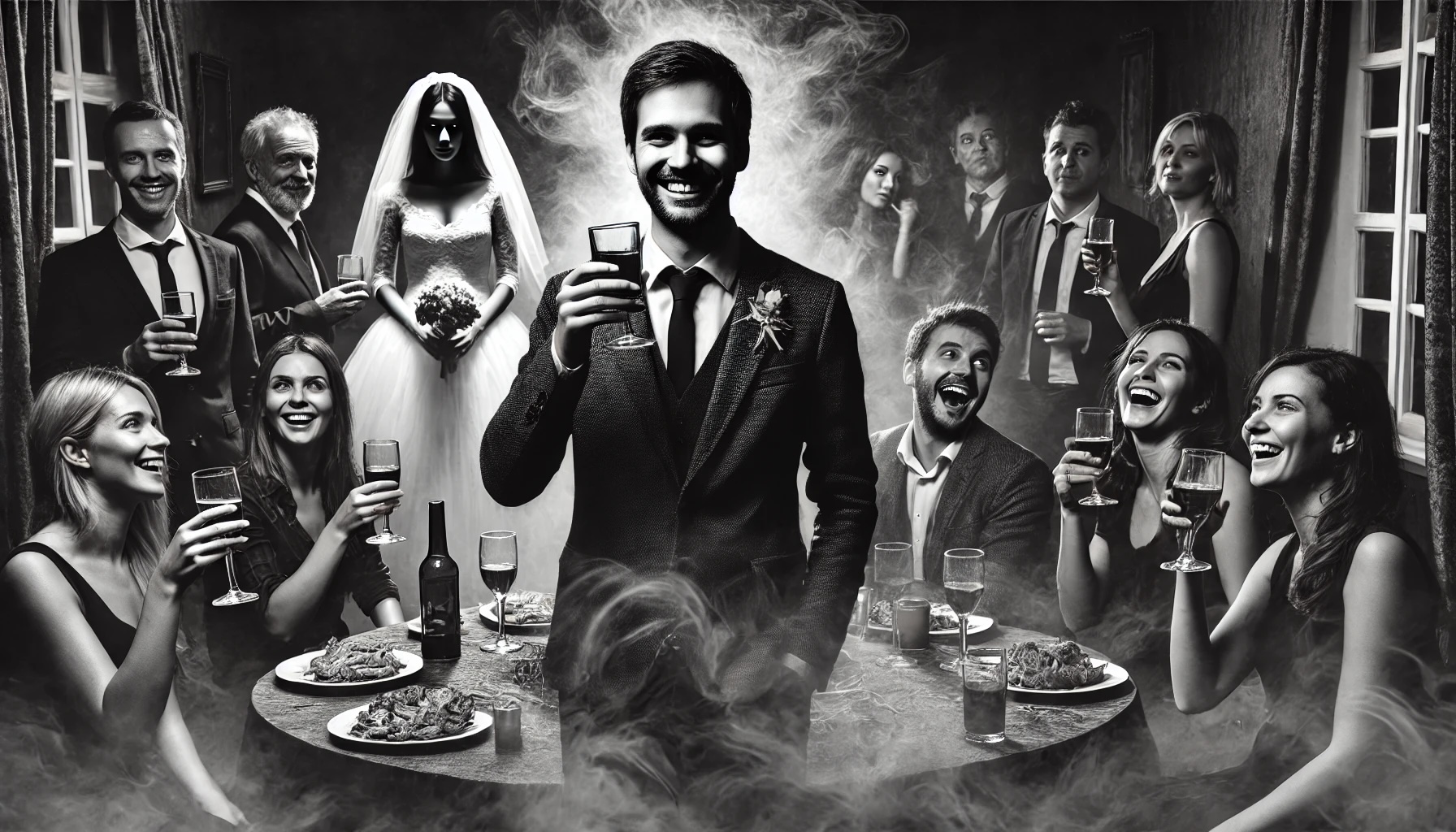Oh yeah! Bill and Mary have officially ended their 12-year marriage after a messy divorce that paid for the lawyer’s new Porsche 911 Turbo S. To mark the occasion, Bill is throwing a divorce party to celebrate his newfound independence. The plans are already in motion: friends, family, a pig on the spit, a keg of beer, and cases of Champagne. Bill is even stupid enough to include his two kids, who will be there to watch their dad celebrate. Bill’s life is rebooting, ready for the online dating circuit and late-night prowls—the jaguar unleashed. It is very exciting for him, or is it?
Bill asked me to say a few words at the party—after all, I was his best man at his wedding, so he thought it was fitting that I should say something now. I love Bill, but how moronic – what is he thinking; is he thinking at all? Has the divorce taken such a toll on his faculties?
I’m rehearsing in my mind what I would say: “Welcome, everyone, on this night to celebrate Bill’s divorce. What a wonderful occasion—I am so happy for Bill as he marks this new chapter in his life. To be frank, I’m not surprised we’re here. Bill was a prick throughout his marriage. He treated Mary badly, the many affairs, the pole dancer incident in Khao Road, his raging Glenfiddich temper, and the wayward four-handed massage in Ho Chi Minh City. Yip, I am not surprised; however, I am not sure what Bill is celebrating to be honest.”
The truth is—I won’t go to the divorce party. I told Bill straight-up, “Buddy, I am not coming to the party; I’m tired of hearing how terrible Mary was as if it all lies on her.” Mary was the one who filed for the divorce in the first place, so why the hell is there a celebration —how ironic. Bill is celebrating a failure.
Divorce, as I’ve come to understand from personal experience, is nothing worth celebrating. It’s deeply sad and traumatic for everyone involved. Celebrating it is fucking absurd? Divorce isn’t some light-hearted affair that should be trivialised—it’s a life-altering fracture that leaves emotional ripples long after the ink dries on the papers.
Divorce—Not Opposed, But Not Celebratory
Before I go on, let’s be clear—I’m not opposed to divorce. This isn’t a rant from some conservative, right-wing, God-fearing critic of modern relationships. There are times when divorce is not only necessary but the healthiest path forward. Relationships can erode, becoming loveless or purely functional, and staying together solely for appearances can be worse than parting ways. For children trapped in a storm of dysfunction, a well-handled separation is paramount. I’m not sure if a divorce party is “responsible parenting” when it comes to involving the children.
When managed with compassion and mindfulness, divorce can lead to better outcomes for everyone involved. But this isn’t about the morality or necessity of divorce. This is about celebrating it like a milestone worthy of party hats and Champagne. No matter the circumstances, marking such a painful life failure with a festival feels, at best, misguided.
Don’t Celebrate the Hurt
Divorce is more than just an end; it’s a seismic event that damages lives, especially children’s. Research shows that children of divorced parents face an elevated risk of long-term psychological challenges, including anxiety, depression, and trouble forming stable relationships. Judith Wallerstein’s research highlights that these effects often resurface in adulthood when children navigate their own relationships. Since my divorce, life has been relationship chaos, personified, and it remains unresolved. Read more on the psychological impact of divorce.
Adults don’t escape unscathed, either. Trust me. Divorce can introduce financial strain, emotional scars, and social isolation. Sure, some find freedom and peace on the other side of a toxic relationship, but for many, the aftermath isn’t the clean slate they’d hoped for. It’s tangled, messy, and full of stumbles and fuckups. The clinking of glasses at a divorce party glosses over these realities; reducing complex human experiences to a party is shortsighted.
Why I’m Not Going
This is why Bill’s party feels so off. Celebrating the end of a marriage with laughter and cake, as if it’s a retirement party, erases the hard truth: something significant and meaningful fell apart. And what about Bill’s kids, who will witness this spectacle and wonder what’s there to celebrate in the dismantling of their world? They didn’t choose this; they’re left adapting to a life split in two. Sure, Bill’s revelry might be cathartic for him, but at what cost?
If a couple decides to have a divorce party that brings together a few close friends to celebrate the wonderful times they had together and their unified agreement to go their separate ways, that might be a very mature approach. I think it is more of an exception to the rule. I also think it would be a bit of an awkward event to attend.
The Culture of Celebration
Western culture, as are many other cultures, is all about celebrating personal milestones, even painful ones. Divorce parties fit right in with a society that prioritises individual happiness above all. The same culture that brought us “conscious uncoupling” now pushes divorce as a rite of renewal, not as an acknowledgment of failure or loss. The irony is glaring—a party where resilience is celebrated, but accountability and introspection are absent.
Compare this to societies where marriage is woven into the social and religious fabric, like India or parts of the Middle East. There, divorce is met with gravity and an understanding of its broader impact. A divorce party in those regions would be unimaginable, viewed as insensitive to the community and the shared sense of loss.
Healthier Ways to Move On
Marking the end of a marriage doesn’t need a raucous party. If closure is needed, there are better, more thoughtful ways to go about it. It. may sound cliche, but post-divorce counselling can help parents establish co-parenting strategies and find a healthier balance. Mediation fosters dialogue that acknowledges the pain but leans toward healing. A reflective solo retreat or a quiet dinner with close friends can provide a sense of closure without making light of the past. Maybe climb a mountain or hit the gym. If that is not your tea, go on a safari or join a book club. Maybe even consider birdwatching. Whatever, make healthy choices that show positive role modelling to your children.
It’s important for those who’ve been through a divorce to find peace, but how one chooses to move forward matters. There’s a fine line between celebrating newfound freedom and acknowledging the loss. Moving on should involve compassion and understanding for everyone affected—not just the couple but their children, families, and friends.
Anyway, it’s your life. Do what you want, but be mindful of the impact of your actions on others.
Explore more on constructive paths to emotional and social recovery after divorce.
FAQs
Is celebrating divorce beneficial for emotional healing?
While some argue that celebrating a divorce offers closure, it can oversimplify complex emotions. Reflective gatherings or counselling are better for long-term healing.
What are the long-term effects of divorce on children?
Children of divorced parents face higher risks of anxiety, depression, and difficulties in forming stable relationships. These effects often last into adulthood. Learn more.
Are divorce parties common worldwide?
No, they are mostly found in Western cultures. In other societies, divorce is approached with solemnity, reflecting its impact on families and communities.
What are better ways to acknowledge the end of a marriage?
Counselling, mediation, or intimate gatherings offer space for closure without making light of the past.
Why do some people choose to celebrate their divorce?
For some, divorce parties are a way to reclaim freedom after a difficult chapter. However, they can sidestep deeper reflection and minimize the emotional stakes.
Can divorce ever be seen as a positive change?
Yes, especially if it means leaving a toxic relationship. Still, moving on should balance personal happiness with respect for everyone involved.
Judith Wallerstein’s research, cultural discussions on marriage and divorce.

